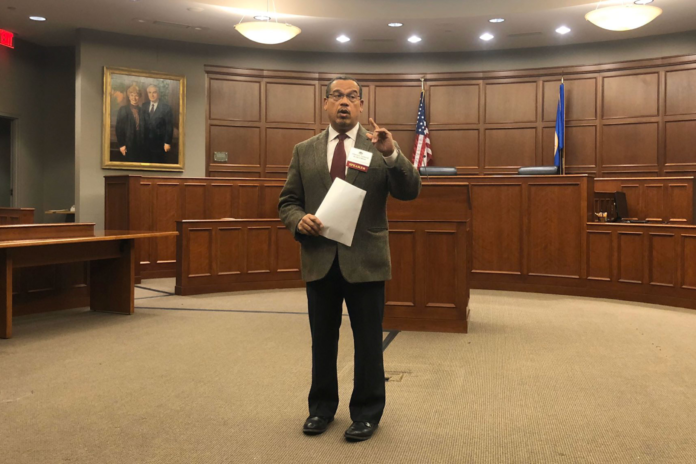Minnesota Attorney General Keith Ellison joined 22 of his colleagues in urging the U.S. Supreme Court to reject a Texas lawsuit that seeks to overturn the election results in four battleground states.
Georgia, Michigan, Pennsylvania and Wisconsin are named as defendants in Texas Attorney General Ken Paxton’s lawsuit, which was filed Tuesday in the U.S. Supreme Court.
“The four states exploited the COVID-19 pandemic to justify ignoring federal and state election laws and unlawfully enacting last-minute changes, thus skewing the results of the 2020 General Election,” Paxton’s office said in a press release. “The battleground states flooded their people with unlawful ballot applications and ballots while ignoring statutory requirements as to how they were received, evaluated and counted.”
More than 100 U.S. House Republicans filed an amicus brief in support of the lawsuit, as have 17 Republican attorneys general.
“This brief presents [our] concern as Members of Congress, shared by untold millions of their constituents, that the unconstitutional irregularities involved in the 2020 presidential election cast doubt upon its outcome and the integrity of the American system of elections,” states the GOP brief.
Ellison called the lawsuit a “last-ditch, evidence-free effort to undemocratically throw out the votes in states where [Paxton] just doesn’t like the result.”
“The people of America — including the people of Minnesota and these four other states — have spoken loud and clear: they have elected Joe Biden president, period,” said Ellison. “Unfounded and frivolous challenges to the American people’s will have been thrown out in courts across the country.”
In a press release, Ellison’s office said the Texas lawsuit “depends on specious claims of voter fraud, offering no evidence whatsoever of systemic voter fraud in the November election.”
The amicus brief filed by Ellison and his colleagues argues that Texas’ interpretation of the U.S. Constitution’s Electors Cause “is contrary to a century’s worth of precedent.”
“The Electors Clause of the Constitution grants the states the power to set their own rules for presidential elections held within their own states,” Ellison’s office said. “While the text of the Constitution says this authority is given to ‘state legislatures,’ since the early 20th century, the Supreme Court has allowed the legislatures to delegate this authority to elections administrators or other state government entities.”
Additionally, the Democratic attorneys general argue that the Texas case would infringe on the right of states to determine the process for administering their own elections.
15 state legislators sent a letter to Paxton Thursday asking him to add Minnesota to the list of defendants.

















